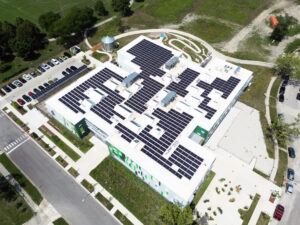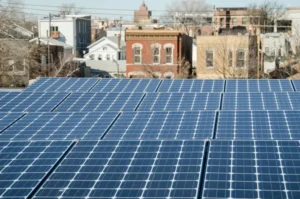When deciding between a local and a national solar company, your choice can affect your home’s energy costs, installation experience, and long-term savings. This article outlines the main benefits of local and national providers, and suggests using a solar calculator to gauge potential financial impacts; compares installation costs, customer reviews, and financial incentives; and explains how both options can help reduce your environmental footprint.
What Are the Key Benefits of Choosing a Local Solar Company?
Local solar companies offer significant advantages. They possess in-depth knowledge of regional building codes, weather patterns, and permitting procedures, which can lead to smoother installation processes and lower risks such as improper panel angling or shading. Their personalized service typically includes face-to-face consultations, on-site evaluations, and custom design options tailored to your home. Being embedded in the community ensures prompt responses during installation or maintenance, and local financing partnerships may further ease your project.
How Does Local Expertise Improve Solar Installation Outcomes?
Local expertise means installations adhere to region-specific regulations and environmental conditions. Local companies use their understanding of permitting processes, weather impacts, and local grid requirements to design systems that perform optimally. This tailored approach minimizes risks and often results in shorter approval times and fewer callbacks, making the process more both time-efficient and cost-effective.
Why Is Personalized Service Important With Local Solar Installers?
With local installers, personalized service is a key benefit. They typically offer face-to-face consultations and on-site evaluations that recognize your unique energy needs and aesthetic preferences. This direct interaction builds trust and often leads to long-term maintenance relationships and upgrade options, ensuring that your system continues to perform well.
How Do Local Solar Companies Support Community and Faster Response?
Deep community ties allow local companies to provide faster responses throughout your project’s lifecycle. Their local presence means more flexible scheduling for upgrades or repairs and the ability to quickly address any issues. This connectivity reduces downtime and ensures your transition to solar energy is smooth and reliable.
What Advantages Do National Solar Companies Offer Homeowners?
National solar companies leverage large-scale operations to offer competitive pricing and consistent quality. Their heavy investments in research and development result in cutting-edge technology and industry-leading products. Homeowners benefit from nationwide warranties, a broad service network, and standardized installation processes that reduce delays. Additionally, their extensive financing options cater to a wide audience, making solar power accessible for many.
How Does Brand Recognition Affect Trust in National Solar Providers?
Well-known national brands inspire consumer confidence. Decades of rigorous testing, high industry standards, and comprehensive customer service systems provide visible proof of quality. Transparent warranties and shared case studies help reassure customers, reducing hesitation during the purchase process.
What Financing Options Are Typically Available From National Solar Companies?
National providers offer a range of financing options, including traditional loans, power purchase agreements (PPAs), and leases. Their large-scale operations allow them to negotiate favorable terms and partner with major financial institutions. These options help lower upfront costs and accelerate your return on investment, making the transition to solar energy more financially manageable.
How Does a Wider Service Area Benefit National Solar Customers?
A national presence ensures standardized procedures and consistent post-installation service across multiple regions. National companies can use centralized resources and advanced tools like remote monitoring to quickly diagnose issues and provide timely maintenance, offering reliable support regardless of your location.
How Do Installation Costs Compare Between Local and National Solar Companies?
Installation cost is a critical factor. Local companies often provide customized pricing reflective of regional market conditions and specific project needs. In contrast, national providers benefit from bulk purchasing and standardized pricing, which can sometimes lower costs despite additional fees for large-scale operations. Ultimately, the return on investment (ROI) depends on installation specifics, geographic factors, and the financing options you choose.
What Factors Influence Solar Panel Installation Pricing Locally vs. Nationally?
Costs vary due to system size, labor rates, permitting fees, and local market dynamics. Local companies adjust their prices based on regional supply chain variables, while national companies offer bulk discounts and streamlined processes that lower per-unit material costs. Your final decision may depend on which option provides the best balance of cost and service quality for your installation.
How Do Financing Options Differ Between Local and National Providers?
Local installers may offer flexible loan packages through regional banks or credit unions that reflect local economic conditions. National companies, however, typically provide a suite of standardized financing solutions with competitive rates available nationwide. While both options strive to improve cost-to-benefit ratios, the right choice depends on your local market and individual financial circumstances.
What Is the Expected Return on Investment (ROI) for Each Option?
ROI is measured by reduced monthly electric bills, increased property values, and faster payback periods through available incentives. Typically, homeowners see a payback period of six to eight years. National companies sometimes achieve further cost efficiencies due to economies of scale, while local providers may offer comparable performance by customizing systems to local conditions.
Below is a summary of key cost and ROI factors:
| Factor | Local Solar Companies | National Solar Companies |
| Installation Cost | Customized pricing based on local rates | Standardized pricing with bulk discounts |
| Financing Options | Flexible regional loans/partnerships | Uniform options with competitive APRs |
| ROI Payback Period | Typically 6-8 years, adjusted for local factors | Similar, with added scale efficiencies |
| Warranty & Maintenance Support | Personalized and prompt service | Nationwide network with standard coverage |
What Do Customer Reviews Reveal About Local vs. National Solar Companies?
Customer reviews offer insights into system performance, service quality, and post-installation support. Local companies are often praised for their accessible, personalized service and rapid problem resolution through in-person consultations. In contrast, national providers receive positive reviews for their robust infrastructure, comprehensive warranties, and consistent service standards across different locations.
How Do Case Studies Highlight Differences in Customer Experiences?
Case studies illustrate that local projects benefit from immediate, face-to-face troubleshooting, leading to reduced system downtime. National projects, meanwhile, are noted for systematic management and advanced remote monitoring, ensuring consistency across multiple installations.
What Common Themes Appear in Testimonials for Local Installers?
Local installer testimonials frequently mention personalized recommendations, ease of communication, and quick scheduling adjustments. These factors build trust and demonstrate a dedicated approach to customer care, which is highly valued among residential users.
How Do National Company Reviews Reflect Service and Satisfaction?
National reviews emphasize reliable system durability, clear documentation, and a standardized process that maintains quality regardless of location. Advanced features like digital service tracking and remote monitoring contribute to overall customer satisfaction.
How Can Homeowners Choose the Right Solar Company for Their Needs?
Selecting the right solar provider involves evaluating your energy requirements, budget, and long-term goals. Compare pricing, warranty terms, financing options, and customer service records. Research customer reviews and case studies, and request detailed proposals or consultations. Whether you choose a local provider for personalized service or a national company for broad scale and resources, ensure that the selected partner demonstrates transparency and proven reliability.
What Questions Should You Ask Before Hiring a Solar Installer?
Key questions include: • What is your experience with local permitting and installation practices?
- Can you provide case studies or customer testimonials?
- What are the details of your warranty and maintenance plans?
- How do you handle potential installation challenges and post-completion support?
How Important Are Warranty and Support Services in Your Choice?
Warranty and support are crucial to protecting your investment. Look for comprehensive warranties covering equipment, labor, and performance. Ensure that the provider offers prompt after-sales service, routine maintenance, and accessible technical support to minimize system downtime.
What Are the Steps to Verify a Solar Company’s Credentials?
Verify credentials by checking for industry certifications (e.g., NABCEP), confirming licensing and insurance status, and reviewing past project documentation. Personal consultations and reputable online testimonials can further ensure you are working with a qualified provider.
How Can Solar Incentives and Rebates Maximize Your Savings?
Solar incentives—federal tax credits, state rebates, and local programs—can significantly lower your installation costs and reduce payback periods. An informed installer can help navigate these options, ensuring that every available incentive is applied to maximize long-term savings.
What Federal Tax Credits Are Available for Solar Installations?
The federal Investment Tax Credit (ITC) allows you to deduct a substantial percentage of your installation cost from federal taxes—historically around 26%. This credit applies to both residential and commercial projects and is vital for lowering overall costs.
How Do State and Local Incentives Differ for Solar Customers?
State and local incentives vary widely. Some regions offer rebates per watt installed, while others provide performance-based or special financing programs. Local net metering programs can also credit excess power generation, further reducing energy bills.
What Rebate Programs Can You Access Through Local Solar Companies?
Local providers often have detailed knowledge of regional rebate programs, grants, or state-sponsored loans that can further reduce costs. Their community ties enable efficient navigation of paperwork and ensure you meet eligibility requirements.
What Are the Environmental and Energy Savings Benefits of Choosing Solar?
Solar energy reduces reliance on fossil fuels, cutting greenhouse gas emissions and lowering your carbon footprint. Additionally, significant reductions in monthly electricity bills and more predictable energy costs contribute to both environmental sustainability and long-term financial benefits.
How Does Solar Energy Reduce Your Carbon Footprint?
By converting sunlight directly into electricity with no harmful emissions, solar panels provide a clean, renewable energy source. Over the system’s lifespan, this leads to a substantial reduction in greenhouse gas emissions and helps combat climate change.
What Long-Term Energy Savings Can Homeowners Expect?
Many homeowners experience reductions in utility bills of up to 50%, with the initial investment often recouped within six to eight years. Increased property values and stable energy prices further enhance the financial appeal of solar installations.
How Do Local and National Companies Promote Sustainability?
Both provider types support sustainability. Local companies engage in community initiatives and adapt solutions to regional environmental conditions, while national companies implement advanced technologies and standardized practices that lower carbon emissions on a larger scale.
Final Thoughts
In summary, choosing between local and national solar companies depends on your individual needs. Local providers excel in personalized service and quick community-based support, while national companies offer economies of scale, standardized processes, and extensive resources. Careful evaluation of installation costs, financing, warranties, and customer reviews is essential to making an informed decision that meets your energy goals and budget. Consider reaching out to Windfree Solar at (312) 588-6953 or visiting their website to explore the best solution for your home.
Frequently Asked Questions
Q: What should I look for when comparing local and national solar companies?
A: Evaluate installation expertise, personalized support, warranty terms, and financing options to find the best fit for your energy needs.
Q: Can solar incentives really reduce my overall installation cost?
A: Yes. Federal tax credits, state rebates, and local incentives significantly lower upfront costs and improve ROI.
Q: How quickly can I expect to see energy savings with a solar installation?
A: Most homeowners see reduced utility bills immediately, with a typical payback period of 6-8 years.
Q: Are there risks associated with choosing a lower-cost local installer?
A: Thoroughly verify credentials and check customer reviews to ensure quality workmanship and reliability.
Q: How do Windfree Solar’s services differ from other providers?
A: Windfree Solar offers full-service design, installation, and tailored financing solutions backed by extensive experience and regional expertise.




